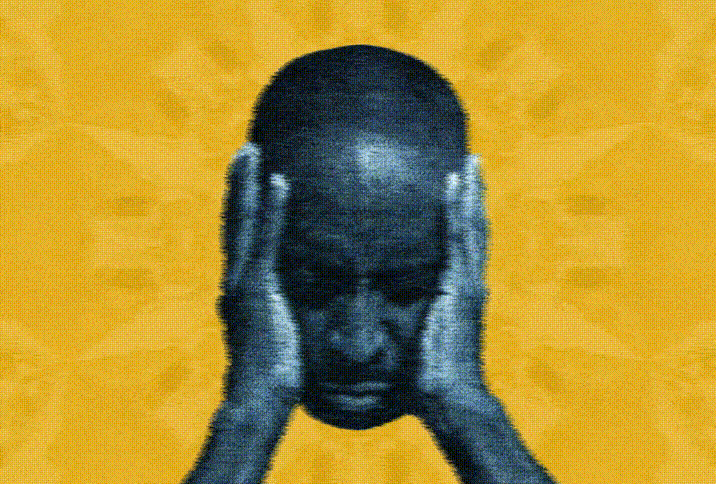Brain Zaps May Leave You Shocked

Brain shivers, brain shock, brain zaps, brain flips—all terms used to describe a combination of dizziness and "electric" shock sensations in the head.
About 56 percent of people coming off antidepressants experience withdrawal symptoms, according to a 2019 systematic review published in Addictive Behaviors. Reporting in the Cleveland Clinic Journal of Medicine indicated 30 percent of individuals experience brain zaps when tapering off antidepressants. However, individuals could experience brain zaps without medication as a result of head and eye movement, stress and anxiety, insomnia and drug use.
Despite being a common symptom, the phenomenon is hard to explain.
"Brain zaps feel like I'm entering an alternate reality for a split-second," said Sophia Sykes, a college student in Tennessee who has experienced the symptom firsthand. "My sight shutters and my head feels like I just went down a big roller-coaster drop. It's hard to explain to someone who does not have brain zaps what they feel like."
Others describe the experience as the moment of static when changing a channel on an old TV, a thunderclap inside the brain and/or a small seizure. Some individuals hear crackling sounds, see flashes like strobe lights or feel a change of consciousness. However, a study published in 2022 in the Primary Care Companion for CNS Disorders indicated the majority of individuals who experience brain zaps report an electrical jolt or shock.
Despite being described as a distressing symptom, it's important to note brain zaps are not dangerous. Additionally, there is no evidence brain zaps have any long-term effects.
What causes brain zaps?
Brain zaps are grouped with antidepressant discontinuation syndrome, a symptom of antidepressant medication withdrawal. Others refer to the symptom as small partial seizures or "mini seizures," thought to be affecting a particular part of the brain. While neurological symptoms include unusual sensations that feel as if they're coming from inside the brain or skull, some individuals experience the "zap" traveling outside the brain to the face and limbs. Some research indicates rapid eye movement may play a role, too.
What exactly causes brain zaps? No one actually knows.
Zahraa Surtee, a holistic psychologist and registered counselor at the Oprah Winfrey Academy of Leadership for Girls in South Africa, said the body undergoes certain changes to balance the dependence on removed antidepressants.
"When antidepressants are stopped, the body may respond with physical and emotional symptoms caused by the sudden absence of the antidepressant," Surtee said. "Your doctor may diagnose you with antidepressant discontinuation symptoms if you suddenly develop symptoms days after stopping an antidepressant; additionally, if symptoms rapidly go away when you start taking the antidepressant again."
Steven Hyman, M.D., a neuroscientist, director of the Stanley Center for Psychiatric Research and a member of the Broad Institute of MIT and Harvard University, explained the long-term effects of psychotropic drugs on the brain, including molecular and cellular changes in neural functions. As a result of increased neurotransmitters such as serotonin and norepinephrine, reactions increase between cells. Antidepressants allow for a balance of neurotransmitters, which affect mood and emotions. As a result of abrupt discontinuation of serotonin and norepinephrine reuptake inhibitors (SNRIs) or selective serotonin reuptake inhibitors (SSRIs), an imbalance occurs.
Symptoms of antidepressant discontinuation syndrome include flu-like symptoms, fatigue, vertigo, nausea, headache and paresthesia, which is a burning or prickling sensation in parts of the body.
Other causes of brain zaps
Stopping antidepressant use isn't the only cause of brain zaps. Additional factors include the following:
Head/eye movement
Head movement affects the vestibulo-ocular reflex, which stabilizes the gaze and creates eye movements, such as from side to side. In the aforementioned Primary Care Companion study, about 39 percent of individuals reported brain zaps were triggered by eye or head movements. However, there is a lack of research surrounding this correlation.
Stress and anxiety
Dysregulation of the nervous system affects different neurotransmitters, including the activation of neuroendocrine and hormonal functions. Behavioral changes result in anxiety, epilepsy and insomnia due to the fluctuation of GABA (gamma-aminobutyric acid) receptors. Like antidepressant discontinuation syndrome, chronic stress and anxiety can create changes in neurotransmitters such as serotonin and GABA receptors.
As a result, chronic stress can lead to changes in psychiatric, developmental and endocrine/metabolic health.
Insomnia
Like stress and anxiety, low levels of the brain chemical GABA, which are associated with insomnia, cause hyperarousal. The imbalance in the brain inhibits neurotransmitters such as serotonin and norepinephrine. Due to changes in neural functioning, brain zaps may occur.
Drug use
Drugs affect neurons' ability to send, receive and transmit information. Some drugs, such as alcohol, cocaine, MDMA, marijuana and heroin, can mimic neurotransmitters. Drugs can cause neurotransmitters to carry excessive messages, while other effects are eliminated or lessened.
As a result, neurotransmitters such as dopamine, epinephrine, norepinephrine, serotonin and GABA are affected. The imbalance caused by neuron fluctuation may cause brain zaps.
How symptoms effect daily life
In the research published in the Primary Care Companion, 40 percent of individuals indicated the negative effects of brain zaps had a significant interference in daily functioning, including 17 percent who identified the effects as having an overwhelming interference with functioning.
Brain zaps are likely to occur with other neurological effects such as vertigo, confusion, tremors and visual changes. Additionally, the phenomenon is typically associated with depression, anxiety, insomnia, mood changes and sexual dysfunction.
Medication withdrawal symptoms may occur for days or weeks after use. However, studies show that symptoms may persist longer after SSRI discontinuation. Some medications have persistent symptoms years after discontinuation.
Treatment options
Gradual dosage reduction is the main treatment option for individuals experiencing brain zaps.
"There is no cure for brain zaps, but they tend to subside over time," Surtee said. "Once the body has adjusted to the change in antidepressant dosage/weaning off antidepressants altogether, brain zaps and other side effects may decrease."
However, for individuals who experience the sensation without drug use or discontinuation, Kim Chronister, Psy.D., a clinical psychologist based in Los Angeles, emphasized eliminating chronic stress and anxiety to alleviate symptoms.
"Stress and anxiety are physiological responses—the body's response—to distress. Most people don't realize that persistent worry thoughts and perseverating for long periods on stressors can have this physiological effect," Chronister explained. "It's best to be proactive and help to prevent this by engaging in mind-body activities, engaging in talk therapy or finding ways to combat stress with positive distractions, such as relaxing hobbies."
Although symptoms may be distressing, studies indicate brain zaps are not dangerous. However, if brain zaps and other neurological effects disrupt your day-to-day activities, it's important to reach out to your physician to discuss the best available treatment for you. Do not abruptly stop an antidepressant medication without speaking to your physician. Additionally, weaning off medication should also be assisted by a physician.


















